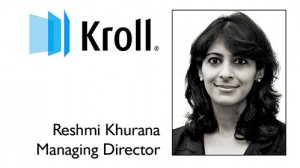Email: rkhurana@kroll.com
Website: www.kroll.com
 While the political winds of the past 12 months seem to reflect an anti-globalisation sentiment in many major economies around the globe, it remains to be seen how this will impact the global flow of investment funds. Corporations tend to be opportunistic and Asian markets continue to present an arguably significant and growing investment opportunity, which is too large to ignore.
While the political winds of the past 12 months seem to reflect an anti-globalisation sentiment in many major economies around the globe, it remains to be seen how this will impact the global flow of investment funds. Corporations tend to be opportunistic and Asian markets continue to present an arguably significant and growing investment opportunity, which is too large to ignore.
Strategic investors often choose to operate in emerging markets via joint ventures with local partners who control the operations of the local companies. Foreign investors in India, for example, often believe local partners are better able to manage India’s operating environment, where there is a close nexus between business, government and bureaucracy. These arrangements may create a perception to the foreign investors that there is something going on that is not visible.
While local businesses can often “see” behind the scenes, foreign investors struggle to do the same, especially in the due diligence phase, when the investor usually has limited access to the company’s financial information and management teams. In this case, it is not easy for a potential foreign investor to judge whether a suspicious transaction is potentially fraudulent or not. For example, local management may engage in related-party transactions to generate cash. However, it may be difficult for potential foreign investors to ascertain whether the cash is being generated for legitimate business purposes or for paying kickbacks to government officials.
It is similarly challenging for foreign investors to understand the performance of their local subsidiaries, joint venture partners and portfolio companies once the investment is complete. This may be because the foreign investor holds a minority position or because they do not control the management and operations of the local company. This leaves foreign investors with limited tools to monitor the performance of the local companies after investment.
Add to this the fact that regulatory oversight mechanisms in many emerging markets are still evolving and complex judicial systems often make it difficult for investors to enforce non-compliance with contractual rights and obligations. Tools available in developed markets — such as efficient courts and dispute resolution systems — cannot necessarily be relied upon in emerging markets to resolve disputes or recover investments in a timely manner, if at all.
As a result, it often becomes difficult for foreign investors to determine the true health of the target business and ethics of local partners. While on one hand foreign investors may end up making poor investment decisions and exposing themselves to regulatory risk, such as the US Foreign Corrupt Practices Act, on the other hand, foreign investors may also miss out on making good investment decisions due to insufficient or conflicting information from various due diligence providers on the ethics of the company. Investors may err on the side of caution and forego investment opportunities due to a lack of information.
However, it is possible to manage and ride these risks. The tips we give to both new and experienced foreign investors looking to invest in emerging markets, with regards to their concerns about fraud include:
- Assess: A qualitative assessment of the operating environment and any potential partners, such as their reputation, political connections, ethical standards and business practices are as important as reviewing growth numbers, financial records and legal documents.
- Understand: Foreign investors need to understand the full dynamics of the business and political environment in the country in which they are investing, to ensure that they make investments with a certain level of confidence. That is an art.
- Prepare well: Investors should not be swayed by the competitive pressures of the investment environment in India, where often too many investors pursue the same opportunities. They should take their time so they are well-prepared and well-informed.
- Never compromise: Investors should select advisers on a “no compromise basis” to ensure that they are truly independent and the integrity of any due diligence process is maintained.
Email: rkhurana@kroll.com
Website: www.kroll.com

















